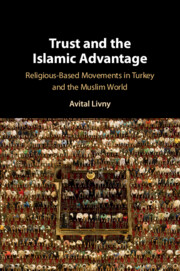Book contents
- Frontmatter
- Dedication
- Contents
- List of Figures
- List of Tables
- Acknowledgments
- 1 Introduction
- Part I Theoretical Development
- 2 Understanding the Rise of Islamic-Based Movements in the Muslim World
- 3 Evaluating Existing Theories of the Islamic Advantage
- 4 Generalized Distrust and the Participation Gap in the Muslim World
- 5 Muslim Identity and Group-Based Trust
- Part II Applications and Empirics
- Part III Theoretical Development
- Appendix
- Bibliography
- Index
4 - Generalized Distrust and the Participation Gap in the Muslim World
from Part I - Theoretical Development
Published online by Cambridge University Press: 31 August 2020
- Frontmatter
- Dedication
- Contents
- List of Figures
- List of Tables
- Acknowledgments
- 1 Introduction
- Part I Theoretical Development
- 2 Understanding the Rise of Islamic-Based Movements in the Muslim World
- 3 Evaluating Existing Theories of the Islamic Advantage
- 4 Generalized Distrust and the Participation Gap in the Muslim World
- 5 Muslim Identity and Group-Based Trust
- Part II Applications and Empirics
- Part III Theoretical Development
- Appendix
- Bibliography
- Index
Summary
If apathy, risk, and information cannot explain the participation gap in the Muslim world, then what accounts for lower levels of political and economic activity in the region? The alternative theory that is developed here focuses squarely on interpersonal trust. It identifies two key conditions -- interdependence and uncertainty -- that, when met, make cooperation and coordination trust dependent. Different types of interpersonal trust are able to sustain collective action at different scales, with the broadest forms of cooperation and coordination requiring trust that is non-particularized, or not based on direct previous experience with the entrusted. Levels of trust and trustworthiness in the Muslim world are assessed, and the region is found to have high levels of honesty, but significantly less interpersonal trust. In contrast to some existing theories arguing that this distrust is culturally determined and unable to change, I find evidence that low trust expectations can indeed beupdated. This speaks to the potential for collective action in the Muslim world, based on the high levels of trustworthiness there, if only individuals can learn to trust one another.
Keywords
- Type
- Chapter
- Information
- Trust and the Islamic AdvantageReligious-Based Movements in Turkey and the Muslim World, pp. 65 - 93Publisher: Cambridge University PressPrint publication year: 2020



